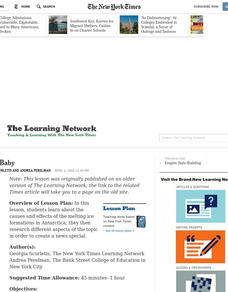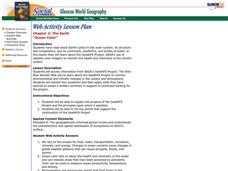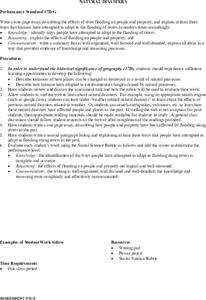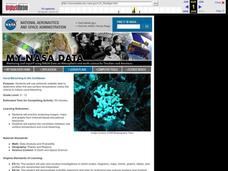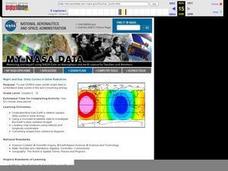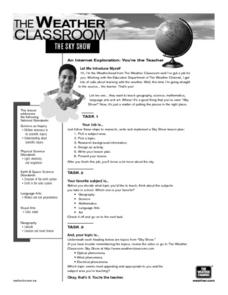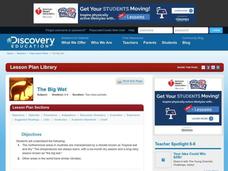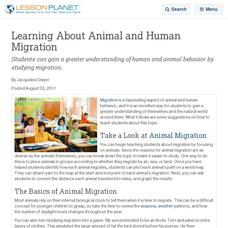Curated OER
How Did This Happen?
Students use websites and discussion to investigate the 2004 Asian Tsunami. Students identify the Indian Ocean coastline's physical, political and human geography features and consider how they affected loss of life and property in those...
Curated OER
Blooming Thermometers
Students study phenology, or the study of climate change. They research the Japanese springtime festival of Hanami and plot and interpret average cherry blossom bloom date data from the past 1100 years.
Curated OER
Ice, Ice, Baby
Young scholars explore the causes and effects of the melting ice formations in Antarctica; they then research different aspects of the topic in order to create a news special.
Curated OER
What Causes Irregular Temperature Patterns?
Students examine common trends in climate across the U.S. They identify the anomalies in hot-cold temperature differences in the U.S and locate them on the map using latitude and longitude coordinates.
Curated OER
Ocean Color
Pupils examine NASA's SeaWiFS Project Web site to explore how the SeaWiFS Project monitors environmental and climatic changes in the oceans and atmosphere. They answer questions and write a summary in support of continued funding for...
Curated OER
To Spread or Not to Spread
Students explore the difference between the three types of contrails. In this contrails lesson, students make observations of contrails and record them. Students identify the three types of contrails and complete an experiment activity.
Curated OER
Tsunamis by the Book
Students use the Internet and other sources to investigate tsunamis. They construct books listing several tsunami facts and cite their sources. They read their books to another class.
Curated OER
Natural Disasters
Students compose essays outlining the effects of floods on humans and their environments. Included in their essays are methods explaining how people have tried to adapt to floods. Using the Internet or provided written materials,...
Curated OER
Coral Bleaching in the Caribbean
Students use authentic satellite data on the NASA website to determine when the sea surface temperature meets the criteria to induce coral bleaching.
Curated OER
Climate Survival
Students use information about different world climate regions to plan how to survive in a particular climate zone for one year. They present their survival plans.
Curated OER
Motion in the Ocean
How does the formation of currents and waves in the ocean happen? High schoolers will learn about the primary causes for ocean currents and waves by calculating a wave's amplitude and nautical mile speed. Then they will complete a...
Maryland Department of Natural Resources
Eyes on Dissolved Oxygen
Learn about the factors that affect the way oxygen dissolves in salt water with a chemistry lab. After studying the molecular structure of water, young scientists figure out how aeration, temperature, and organic waste affect dissolved...
National Park Service
Living & Non-Living Interactions
What better way to learn about ecosystems than by getting outside and observing them first hand? Accompanying a field trip to a local park or outdoor space, this series of collaborative activities engages children in learning about the...
Curated OER
NIGHT AND DAY: DAILY CYCLES IN SOLAR RADIATION
Students examine how Earth's rotation causes daily cycles in solar energy using a microset of satellite data to investigate the Earth's daily radiation budget and locating map locations using latitude and longitude coordinates.
Curated OER
Solar Cell Energy Availability From Around the Country
Students determine areas that are the most likely to produce solar energy by using NASA data. In this solar energy lesson students analyze plots and determine solar panel use.
Curated OER
The Sky Show
Learners use lecture and research to answer the question: Why is the sky blue? students research a variety of other sky phenomena, chart their observations and participate in experiments.
Curated OER
How Does the Earth's Energy Budget Relate to Polar Ice?
Young scholars use satellite data to see how radiation budget relates to the ice that is present in the North. In this energy lesson students correlate data to see a relationship.
Curated OER
Parts of an Ecosystem
Fourth graders study the Great Salt lake and the ecosystem that encompasses it. They study the relationship between an individual of a species, a population of that species, a community that includes that population, and the...
Curated OER
Tornadoes
Students examine the characteristics of a tornado. They practice using new vocabulary and participate in a question and answer session. They use the internet to gather more specific information.
Curated OER
Floodplain Modeling
Students simulate the impact of fluctuating river volumes on structures and landforms. They experiment with table top-sized riverbed models and water. Students consider how human design can help mitigate the effects of a flood.
Curated OER
Food Webs in the Barnegat Bay
Young scholars investigate the food webs in the Barnegat Bay. In this organisms lesson, students use a graphic organizer to illustrate the types of consumers in the bay. Young scholars use reference books to continue to research the...
Curated OER
The Big Wet
Students complete a research project. In this climate lesson, students learn about the climate "tropical wet and dry" found in Australia. Students work in groups to research aspects of this climate and then create a class presentation.
Curated OER
Learning About Animal and Human Migration
Students can gain a greater understanding of human and animal behavior by studying migration.
Curated OER
Shadow Trackers
Students use online websites to inquire about the cycle of day and night. In this web based lesson, students are able to see the movement of the sun and Earth. Students can look at different parts of the Earth as if they were on the Sun...




